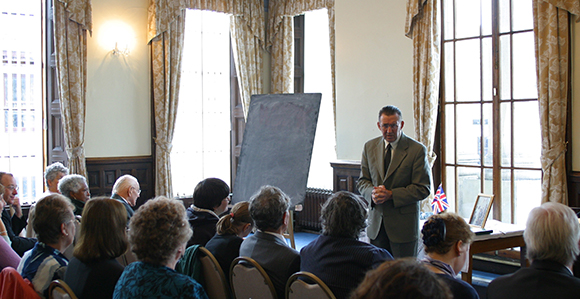Teach the Doctrine: Discussion Is a Means, Not an End
Contributed By Brother Tad R. Callister, Sunday School general president

The teacher is not just a facilitator of gospel discussion; he or she is first and foremost an instrument through whom the Holy Ghost can teach great doctrinal truths, bear powerful testimony, and extend inspired invitations.
Article Highlights
- A vigorous discussion does not equal a successful lesson.
- Teachers can redirect discussion comments to doctrine.
- All are edified when doctrine is taught by the Spirit.
“A gospel discussion is successful if it increases faith, leads to a greater understanding of the doctrine being taught, and inspires the participants to live the gospel more fully.” —Brother Tad R. Callister, Sunday School general president
Related Links
The Lord gave this command to teachers: “Teach one another the doctrine of the kingdom” (D&C 88:77). Perhaps in this context, “doctrine” means those eternal truths and ordinances which, if understood and embraced, lead to exaltation. The Lord also taught how we should teach the doctrine: “by the power of my Spirit” (D&C 43:15).
Of late, there has been an emphasis on teachers using discussion in the classroom, consistent with the counsel in Doctrine and Covenants 88:122: “Appoint among yourselves a teacher, and let not all be spokesman at once; but let one speak at a time and let all listen unto his sayings, that when all have spoken that all may be edified of all, and that every man may have an equal privilege.”
As a consequence, we hear of many inspired classroom discussions. Occasionally, however, we hear of discussions that are open and lively, but at the conclusion there has been little, if any, doctrinal focus or emphasis. In essence, there have been some therapeutic conversations or a sharing of experiences, but little connection to doctrine. I do not think anyone does this intentionally, but sometimes we may lose focus and think that a vigorous discussion, independent of doctrine, equals a successful class. It does not. Discussion is a means, not an end.
A discussion is not successful merely because it is robust or because many class members participated. Many robust discussions occur in business and secular settings and have nothing to do with building faith. A gospel discussion is successful if it increases faith, leads to a greater understanding of the doctrine being taught, and inspires the participants to live the gospel more fully. Alma reminds us of the motivating power of doctrine: “The preaching of the word … had more powerful effect upon the minds of the people than the sword, or anything else” (Alma 31:5).
Role of discussion and discourse
Inspired teaching certainly includes discussion, but it does not, nor should it, exclude powerful discourse and instruction. The teacher is not just a facilitator of gospel discussion; he or she is first and foremost an instrument through whom the Holy Ghost can teach great doctrinal truths, bear powerful testimony, and extend inspired invitations.
I do not know the perfect balance between discourse and discussion. It varies with the individual teacher and promptings of the Spirit. Unfortunately, the discourse method is sometimes overused at the expense of meaningful discussion. In the process of correcting this, however, the pendulum occasionally swings too far in the opposite direction, and teachers abandon any discourse for the sake of discussion as an end rather than a means. To rely solely on one method at the expense of the other may be discounting the most effective way to teach a given doctrine to a given group at a given time.
How do I ensure that discussions are doctrinal?
The ideal teacher is constantly striving to connect class comments to doctrine. For example, a teacher might say, “The experience you shared reminds me of a scripture.” Or, “What gospel truths do we learn from the comments we have heard?” Or, “Would someone like to bear testimony of the power of that truth we have been discussing?”
Self-evaluation
In our effort to teach more like the Savior, each of us might ask the following questions: Do I lecture because I see the lesson as “my presentation” rather than “our lesson?” Am I satisfied solely because we have lots of discussion or am I constantly connecting the dots—discussion to doctrine? Do I favor discussion because it allows me to minimally prepare and ask a few open-ended questions that fill the hour? Or am I doing everything within my power to teach the doctrine as contained in the scriptures and words of latter-day prophets?
Conclusion
May we be obsessed (in a good way) with teaching the doctrine by the Spirit. President Eyring promised, “If you teach the doctrinal principles, the Holy Ghost will come” (CES Satellite Training Broadcast, Aug. 10, 2003). In essence, the doctrine is like a spiritual magnet that draws upon the enlightening and confirming powers of the Holy Ghost. As we humbly teach and focus on the doctrine, we become instruments in God’s hands and the Spirit becomes the ultimate teacher.
